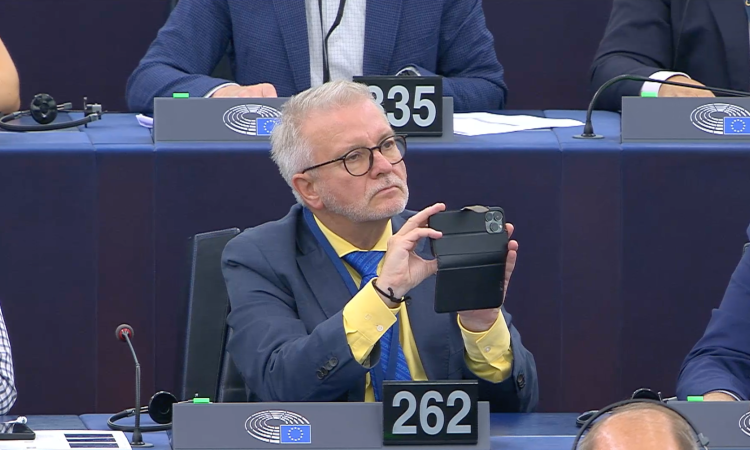
The European Parliament on Tuesday (12 September) approved an EU fund to incentivise joint procurement of arms for Ukraine, closing a year of intense negotiations and the Commission’s first-ever push to help member states procure weapons.
The European Defence Industry through the Joint Procurement Act (EDIRPA) is a €300 million fund proposed shortly after the beginning of the war in Ukraine in 2022. It aims to help EU countries fund urgent defence needs due to the transfer of military assistance to Ukraine is in addition to other EU funds such as the European Defence Fund (EDF) and the Act in Support for Ammunition Production (ASAP).
The new temporary framework, which will be in place until the end of 2025, gathered an overwhelming majority on Tuesday with 530 votes in favour, 66 votes against and 32 abstentions.
As “many member states have announced a significant increase in defence spending in the face of the new security situation, there is a risk that investments will be made purely along the national lines, and that would mean a fragmentation of armaments offers a very damaging lack of interoperability,” Environment Commissioner Virginijus Sinkevičius, who represented the EU executive during the debate as Commissioner Thierry Breton was absent on a trip to France, said on Monday (11 September).
The Parliament’s vote followed an agreement with national defence ministers at the end of June.
Long negotiations in Parliament
EDIRPA is the first European Commission proposal to help restock depleted warehouses after member states donated their equipment to Ukraine, but the last in a row of defence-sponsoring legislation and funds to pass through the European Parliament.
According to rapporteur MEP Zdzisław Krasnodębski (ECR, Poland), the slow progress in adopting the text came from internal battles in the Parliament between committees over the attribution of competencies.
“It was not the Council [ie. member states], nor the European Commission,” Krasnodębski said, pointing the finger at fellow parliamentarians in the chamber.
The one-year long negotiations over an issue deemed as urgent, delayed its implementation. As the member states and Ukraine needed more ammunition and quickly, the EU executive proposed to re-purpose €200 million to the Act in Support of Ammunition Production (ASAP).
Only the beginning
The major political groups in the European Parliament welcomed the step as a good start of a larger industrial policy supporting defence during the debate.
“This initial funding can only be the start so that member states can continue to provide for Ukraine,” MEP Michael Gahler (EPP, Germany), rapporteur for the file, said during Monday’s debate.
“I hope that the Commission will come up with a major investment fund for the defence industry,” Gahler said, wearing a yellow shirt and a blue tie in the colours of Ukraine on the day of the vote. “We have neglected our defence industry for 30 years, it needs more funds,” he added.
€300 million “in terms of defence procurements is basically nothing, but at the same time, it’s good to send this signal and let’s see how it’s moving forward,” For MEP Ivars Ijabs (Renew, Latvia), co-rapporteur for the file, told Euractiv.
The Greens also supported the text despite traditional divisions on procuring and providing military equipment, procurement and joint export controls,” Neumann said.
Greens’ co-chair Philippe Lamberts called for member states to increase the EU budget if they seriously give the European Union additional tasks such as investing in defence industries.
According to EU sources, the EU’s executive is mulling whether to propose a new ‘European Defence Production Act’ to have a say in industry’s production.
It is also supposedly working on a new European Defence Investment Programme (EDIP), which was initially billed to propose a VAT exemption but was postponed to a later date.
Despite the group’s line to vote against the scheme, the European Left’s votes were split.
Europe “deals with a social issue, an incredible social emergency”, but “in this context, the EU’s priority, its emergency, is to stimulate the demand for arms, to help and finance the states to buy more arms. It’s crazy and stupid, and paradoxical”, MEP Marc Botenga (Left, Belgium) said.
[Edited by Benjamin Fox/Nathalie Weatherald]







